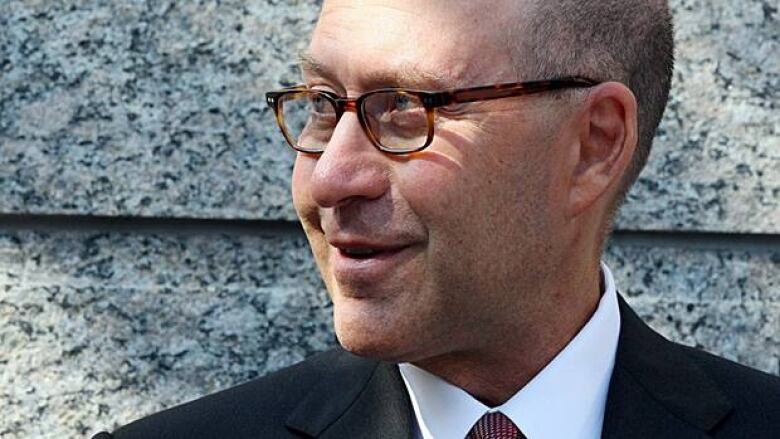'Buy American' less helpful than free trade, Fast says

Free trade will help the economymore than a Buy American rule, International Trade Minister Ed Fast toldthe U.S. government Tuesday.
Fast released a statement Tuesday afternoon to counter comments by U.S. Ambassador David Jacobson that argued Canada will benefit from a U.S. stimulus bill, even if it does have Buy American clauses that make it harder for Canadian exporters to get U.S. contracts.
Fast said Jacobson's comments reflect a view that concerns him.
"History has shown that in times of severe economic challenge, the global economy is revived by lowering trade barriers, and that raising them will have the opposite effect," Fast said in the statement.
"The Obama Administration has in the past recognized that deepened trade is a win-win for both our countries. In particular Canada was deliberately provided an exemption in 2010 to the 'Buy American' provisions that were proposed at that time. Trade-restrictive measures between ourtwo countries were recognized as wrong then, and they remain wrong now.
"In these challenging times, there is simply no better American job creator than trade with Canada. And vice versa. And the best way to do that is through free and open trade," he said.
Jacobsondefended the Buy Americanclause earlier in the day, arguing a boost to the U.S. economy via a stimulus bill would be good for Canada's economy.
The stimulus bill U.S. President Barack Obama was fighting to pass said no government money can go to infrastructure projects unless "all of the iron, steel, and manufactured goods used in the project are produced in the United States."
That bill was defeated in the Senate last week, but Obama could resurrect parts of it in future attempts to boost the American economy.
'Good for Canada'
In an interview on CBC News Network Tuesday, Jacobson said the most important thing the U.S. can do for the Canadian economy, is stimulate the U.S. economy.
"When you compare and contrast that with the, quite frankly, very small economic impact, even if there were a Buy America provision, on balance, this bill as the president originally proposed it, is good very good for Canada," he told host Evan Solomon on CBC-TV's Power & Politics.
"Nobody has made any determinations that Canada will or won't or might be exempt or not exempt. My point today was that if and when this billwere passed, that Canadians ought to be very supportive of that."
In a lunchtime speech to a business crowd in Ottawa, Jacobson indicated his government is holding firm, despite Canadian objections to the clause.
"[President Obama] had to make a tough call. He had to introduce a bill that had some chance of passing. Hence the Buy America provision."
But Jacobson also downplayed the significance of the clause, saying most of the $445-billion package deals with tax cuts, unemployment benefits and other measures that don't affect Canadian companies.
"When you contrast the consequences of the Buy American provision on Canadian commerce ... with the benefits to the Canadian economy of the bill as a whole, I suspect the vast majority of economists in Canada would say they'd take the bad with the good."
Because of the North American Free Trade Agreement, the Buy American rule doesn't apply to projects funded directly by the U.S. governmentbut the vast majority of infrastructure is paid for by states and municipalities not covered by NAFTA.
In the 2009 U.S.stimulus bill, Canada and the U.S. negotiated a side deal to exempt Canada from Buy American restrictions for those "sub-national" governments.
But that deal has expired, and Jacobson is indicating efforts to revive it are going nowhere.
"If the bill doesn't pass, the U.S. economyand the Canadian economy with itcontinue to suffer."
No plans for port traffic tariff
Jacobson also said Canadian fears over possible tariffs on goods being shipped from Canada to U.S. ports are misplaced.
Quoting a statement from the U.S. Federal Maritime Commission chairman, Jacobson said the commission was studying the issue of a harbour maintenance fee in Seattle.
"I called him. I asked, was he contemplating imposing fees, or tariffs, or taxes on goods entering the U.S. from Canada? The commissioner assured me categorically that he was not. Nor was anyone else," Jacobson said.
Jacobson said the FMC has no authority to impose duties, or taxes, or fees on goods entering the United States from Canada.
"So I'm here to give all of you and all Canadians comfort. We don't plan to divert traffic to Seattle from Vancouver by imposing tariffs or taxes or fees on goods crossing into the United States from Canada.
"If that somehow changes, I promise that I'll personally come back here... with egg on my face and explain how I got it wrong."












_(720p).jpg)


 OFFICIAL HD MUSIC VIDEO.jpg)
.jpg)



























































































